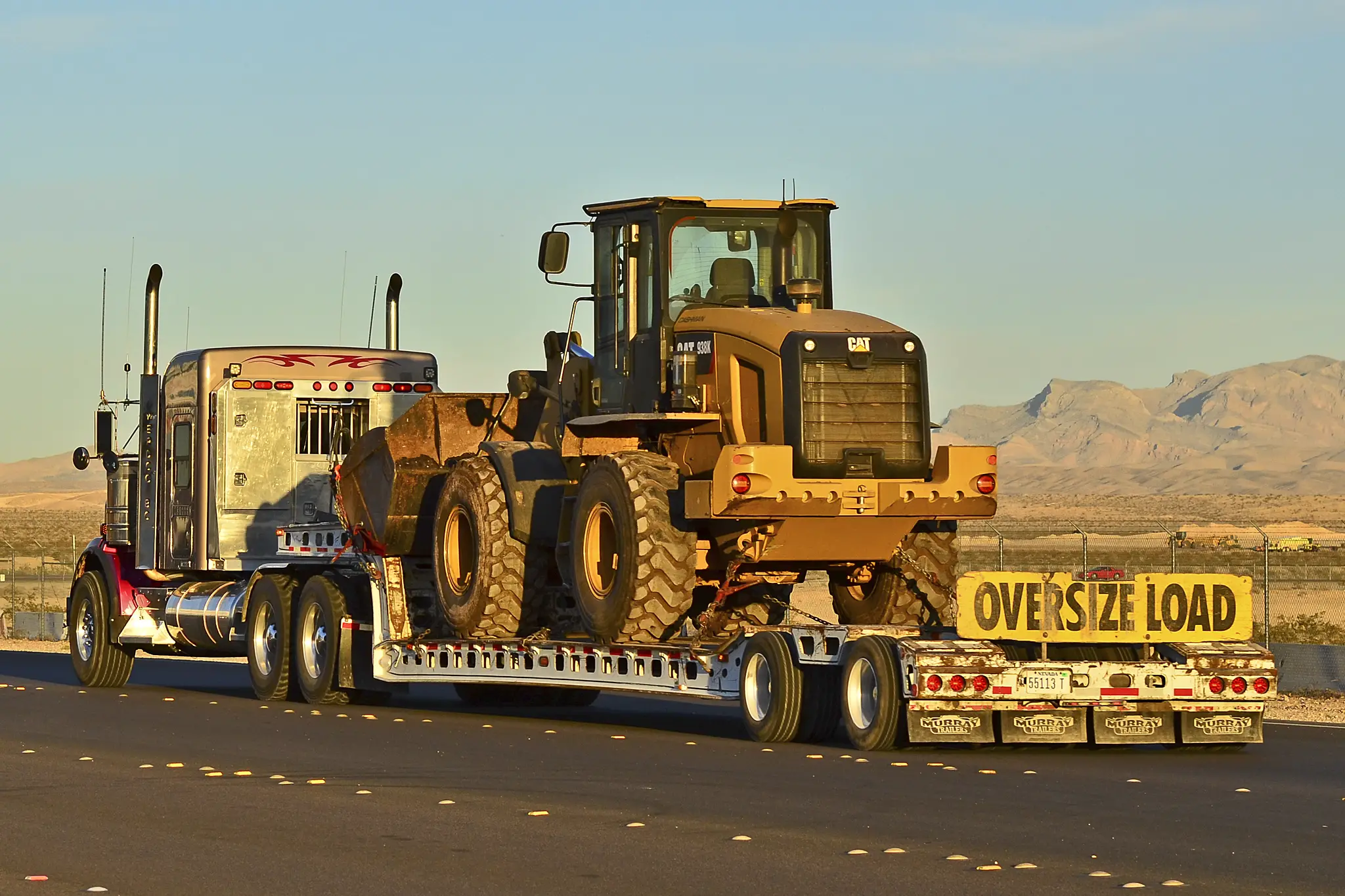Once a person gets their Commercial Driver’s License (CDL) the are expected to keep track of numerous bits of information about their truck. One of the most important pieces of information they are expected to know at all times is the weight of their truck. Federal and states laws have been put into place to ensure that truckers do not overload their trucks while on the road.
Driving with an overloaded truck can bring on get you into varying degrees of trouble. Below I’ll cover the different laws that are in place, how you can ensure your truck isn’t overweight and what can happen if you do choose to drive with an overweight load.
Why are limits in place?
The first state mandated weight limits were put in place by the state of Maine in 1918. At that time, Maine set the maximum allowed weight of a truck at 18,000 pounds. That number has increased significantly over the past 100+ years. In 1974, the federal government passed a law that required trucks to weigh no more than 80,000 lbs. It is possible for trucks to carry more than the 80,000 lbs, however, permits must be acquired before the planned trip. These special permits are only valid on a trip by trip basis.
 When Congress enacted the law in 1974, their primary concern for the large loads that trucks were carrying was due to the bridges in the United States being able to hold the weight being carried by these trucks. The weight of cargo being transported by trucks was increasing quickly and officials were concerned that bridge collapses could occur if limits were not put into place.
When Congress enacted the law in 1974, their primary concern for the large loads that trucks were carrying was due to the bridges in the United States being able to hold the weight being carried by these trucks. The weight of cargo being transported by trucks was increasing quickly and officials were concerned that bridge collapses could occur if limits were not put into place.
As advancements have been made in engineering, the strength of bridges in the United States has improved. However, the larger concern nowadays is the damage that occurs to the pavement on our interstate systems from heavy loads. It is estimated that the average cost to maintain a mile of road per year in the United States can cost anywhere from $2,500 to over $225,000 depending on the location. The upper limits of that range were reported by the New Jersey Department of Transportation.
It’s also estimated, that the average American driver spends $350 a year (or $67 billion overall) on car repairs related to the poor road conditions.
Damaged roads aren’t the only concern that is caused by overweight loads. Overweight loads cause safety concerns for other drivers as well. Adding cargo to an already heavy load impacts a number of things, one being stopping distance.
On average a semi-truck that’s traveling at 65 mph will need at least a quarter of a mile of room to come to a complete stop. In comparison, a regular passenger car weights about 3,500 lbs. The amount of space it needs to come to a stop while traveling at 65 mph is about 60% less than that of a truck.
Another issue that can arise with overweight loads is when a driver is traveling through mountainous areas. Going up a steep grade becomes far more difficult when a truck is overweight. The dangerous part is when the truck begins to go downhill. It’s far too common for a trucker to lose control of his rig when going downhill with a heavy load if they aren’t experienced with large loads.
Other factors that drivers will need to keep in mind is the fact that the center of gravity changes significantly on these loads. This greatly increases the risk of a load shifting which can cause the truck to overturn.
Large loads are can also be difficult to properly secure. A leading cause of trucking accidents is loads not being secured properly. In some states, you can be charged with a misdemeanor if you lose parts of your load due to it being improperly secured.
Weight Limits Explained
New drivers are sometimes surprised to find that there are multiple weight limits that must be obeyed. It can be easy to confuse them at first, but in no time, you’ll know the terminology and what they mean. The weight limits that I list below are the federal limits. Each state could have their own limits. Please be sure to each the DOT website for each state on your route to see if their state requirements vary from the federal requirements.
Gross Weight – The gross weight of a truck is the total amount of weight that the truck weighs. This includes the weight of fuel, driver and cargo. The federal law states that a truck can not weight over 80,000 pounds without special permits.
Axle Weight – The axle weight limitation applies to the maximum amount of weight that can rest on each axel of your truck. The maximum amount of weight per axle is set at 20,000 lbs.
Tandem Weight – This is the maximum amount of weight allowed on your tandem axles when they are between 40” and 60” from one another. The maximum amount of weight allowed on tandem axles is 34,000 lbs.
One area that impacts the weight of your truck that many new drivers forget about, is the weight of the fuel in your tanks. I recently wrote an article that you can find here on this topic to help you calculate the weight of the fuel in your truck and the impact fuel has on your calculations.
Penalties
All states have weigh stations built throughout their state to check the loads of trucks passing through their borders. It’s very common to find weigh stations along the first few miles of an interstate when you cross the border into a state. It’s also common for a state to build a weigh station close to industrial areas that have distribution centers so they can check trucks as they are dropping off or picking up loads.
Fines
The most common type of penalty that you will encounter if you choose to drive with an overweight load is a ticket. The amount of these tickets vary from state to state. The pricing structure of these tickets can vary significantly.
Some states group their fines by the amount of weigh you are over. For example, you may be forced to pay a $50 fine for being 0-1000lbs over the limit.
Other states will charge you for each pound that you go over the limit by. In these states, you could be looking at a fine of $20 plus anywhere from 3 cents to 20 cents for each pound you are overweight.
Charges
The most serious of problems can come when you are involved in an accident. In addition to tickets for being overweight, another concern for driving over the legal weight limits is the possibility of getting hit with criminal charges. The laws vary from state to state, but most states will prosecute a driver if their overweight load caused an accident that results in death or serious injury.

In fact, the owner of American Trucking and Recycling was charged with 1st degree manslaughter due to a crash of one of the companies trucks that killed 4 people. The prosecution proved that the owner failed to correct defects to the braking system of their trucks. A driver who causes a deadly accident due to an overweight load could be proven to be just as negligent.
Legal Problems
Nowadays, there are attorneys that are looking to sue drivers and their companies for every penny they can grab. If you are illegally over the limit and involved in a traffic accident, you can be certain that if the persons involved in the accident hire an attorney, they will conduct an investigation to determine the weight of your load. A lawsuit can cost you millions of dollars if you aren’t properly ensured. There could also be fines, charges and jail time depending on the nature of the accident.
According to the National Transportation and Safety Board, there were 3,864 deaths in 2016 due to accidents with semi-trucks. Of those deaths, approximately 85% occurred when the semi involved weighed more than 26,000 pounds.
Do Overweight Violations Go On Your Record?
There is much debate and misinformation between drivers regarding this question. Laws are always changing, but I’ll try to explain this the best I can. If you have experience anything different than what I’ve found, please leave a comment below!
For the majority of scenarios, an overweight violation will not go on your record. These violations are viewed a moving violation and have no impact on your Compliance, Safety and Accountability Report (CSA) or your Motor Vehicle Report (MVR).
Being overweight WILL go on your CSA if you are found to be overweight during a DOT inspection. These will stay on your record for a total of 3 years.
Conclusion
As you can see, an overweight violation can have a wide variety of consequences. It really comes down the your particular situation. A basic overweight violation is likely to have little to no impact on your record. However, if you are involved in a serious accident that causes injuries or property damage there is a high likelihood that there will be charges brought against you. In addition, it’s entirely possible that lawsuits could also occur depending on the specifics of your case.
